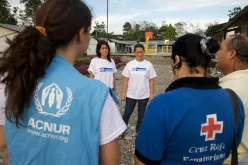At the seventieth session of the UN General Assembly, the Secretary-General reported to Member States on progress on volunteerism since 2012, and presented a Plan of Action for the next decade and beyond (2016-2030). The Plan of Action aims at integrating volunteering in peace and development policies and programmes through a strategic and collective long-term approach that matches the period of SDG implementation. It provides a framework through which civil society, the UN and other stakeholders can support and leverage the potential of volunteerism worldwide.
At the upcoming seventieth session of the UN General Assembly, the Secretary-General will report to Member States on progress on volunteerism since 2012 and present a proposed Plan of Action for the next decade and beyond (2016-2030). The Plan of Action aims at integrating volunteering in peace and development policies and programmes through a strategic and collective long-term approach that matches the period of sustainable development goals (SDGs) implementation. It provides a frame through which civil society, the UN and other stakeholders can support and leverage the potential of volunteerism worldwide. Strategic objectives and actions Evidence shows that when volunteerism is integrated into national development strategies and United Nations plans, people are increasingly able to contribute to achievements in education, health, governance, sustainable livelihoods, security and peace, environment, gender and social inclusion. The Plan of Action focuses on three strategic objectives:
- strengthen peoples ownership of the development agenda through enhanced civic engagement and enabling environments for citizen action;
- integrate volunteerism into national and global implementation strategies for the post-2015 development agenda; and
- measure volunteerism to contribute to a holistic understanding of the engagement of people and their well-being and be part of the monitoring of the SDGs.
For each strategic objective, the Plan indicates a number of actions - see presentation: Integrating volunteering in peace and development - The Plan of Action 2016-2030. Mandated by UN Resolution A/RES/67/138, the Plan of Action is part of the Secretary General Report A/70/118 (see chapter IV) about progress made with regards to the recognition and promotion, facilitation, networking and integration of volunteerism worldwide since 2012. Over the last three years there has been continued growth in public recognition of volunteerism as a common asset through research, international declarations, celebratory events and the promotion of volunteer opportunities for diverse and marginalized people, such as women and youth. National and global discussions on the post-2015 agenda have seen unprecedented levels of volunteer-supported community engagement. UNV also published the second State of the World's Volunteerism Report on Transforming Governance in June 2015.
The Plan of Action has been acknowledged through UN Resolution "Integrating volunteering into peace and development: the plan of action for the next decade and beyond" that called upon Member States, the UN system and a wide range of stakeholders to support and resource the Plan, recognizing UNV as the appropriate UN entity to support its implementation.

